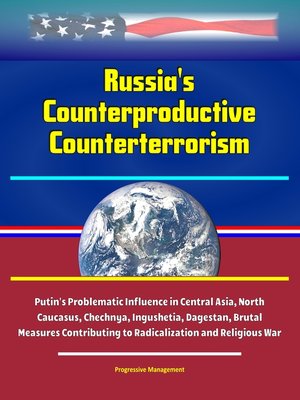Russia's Counterproductive Counterterrorism
ebook ∣ Putin's Problematic Influence in Central Asia, North Caucasus, Chechnya, Ingushetia, Dagestan, Brutal Measures Contributing to Radicalization and Religious War
By Progressive Management

Sign up to save your library
With an OverDrive account, you can save your favorite libraries for at-a-glance information about availability. Find out more about OverDrive accounts.
Find this title in Libby, the library reading app by OverDrive.



Search for a digital library with this title
Title found at these libraries:
| Loading... |
Comments from a professor at the National War College in a hearing Commission on Security and Cooperation in Europe:
You already know that in the past 20 years or so fighting terrorism has become the top priority for the Russian Government. And it is understandably so because over those two decades the Russian authorities have been fighting Islamist insurgency and terrorism, mostly originating from the tumultuous North Caucasus—Chechnya, Ingushetia, Dagestan, and a number of other subjects of the Russian Federation. And since recently, the Russian Government has been grappling with the threats posed by international jihadist groups as well. I do want to acknowledge the sheer complexity and magnitude of the challenges that Moscow faces. But I also contend that, overall, Russia's counterterrorism policy, as you already mentioned in your introductory comments, has been both deficient and counterproductive. And I believe that two trends in particular have contributed to these deficiencies.
One trend has to do with the fact that Russia has always emphasized punitive counterterrorism measures at the expense of kind of broader preventive socioeconomic approaches targeting the root causes of violent radicalization and terrorism. Whether domestically in North Caucasus, or regionally in Central Asia, or internationally in Syria or elsewhere, Russia has used kind of that approach that was singularly focused on the use of military force or security services operations. And those have been counterproductive. In North Caucasus, for example, the brutality of those measures transformed what used to be localized struggle into the region-wide religious war. In Central Asia, as another example, the singular focus on military responses to counterterrorism also diverted attention of these governments from the root causes of terrorism. And I'm pretty sure my colleague, Dr. Carpenter, will talk today about Russia's efforts—counterterrorism efforts in Syria, where Russia's backing for the authoritarian regime of Bashar al-Assad and its indiscriminate airstrikes have also contributed to the radicalization of the Syrian population.
This compilation includes a reproduction of the 2019 Worldwide Threat Assessment of the U.S. Intelligence Community.






